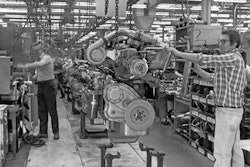There is a growing feeling among industry watchers that in order to fully settle the decidedly unsettled regulatory situation surrounding the hours of service, Congress is going to have to legislate a solution.
That sentiment has come to me from industry executives, consultants, former regulatory types and, in some senses, drivers. Comments from owner-operators and others to the federal docket for the proposed hours changes have reflected a common feeling that the proposal, with its mandated breaks and extra two hours a couple times a week to accommodate for inefficient shippers, was woefully complex, so much so that compliance would be an added hurdle to for any legal hauler, even using an electronic logging device that partially automates compliance.
And the questions still looming are many — will FMCSA reduce driving hours to 10 from 11, as they said in the proposal they had a preference for doing? And never mind the July 2011 deadline for a final rule imposed on the agency by the court in settlement with safety groups back in December 2009. The latest news, of course, is that FMCSA has jumped that deadline before it ever arrived, requesting further comment on four additional studies recently added to the docket.
Take heart at least that one of those studies, “The Impact of Driving, Non-Driving Work, and Rest Breaks on Driving Performance in Commercial Motor Vehicle Operations,” conducted by the Virginia Transportation Research Institute, can be read at least in part as providing underpinning for potentially keeping the 11th hour of driving. “The results of this analysis found no statistically significant effect for the 11th driving hour,” it reads in part. “In particular, and of primary interest for this study, the 11th driving hour did not present an increase in risk of [safety-critical event] occurrence as compared to the 8th, 9th, or 10th driving hours.”
The other study that deals with truck drivers (two of the four studies added to the docket for comment dealt by contrast with bus drivers), “Hours of Service and Driver Fatigue-Driver Characteristics Research,“ conducted by the Larson Transportation Institute of Penn State University and published just this month, spent a great deal of effort looking at the restart provision, concluding there was significant coincidence of use of the 34-hour restart and crashes – truckload drivers are, the study finds, in some senses more likely to get in a crash after taking a 34-hour restart than after a normal start of day. In another part of the study, there seem to be conclusions made that are directly contrary to the Virginia conculsions about the 11th hour.
In any case, the American Trucking Associations has contended the cost-benefit analysis underpinning the new rule is based on borderline fradulent math, and if that’s true, well… Let’s just say I haven’t come to any firm conclusions about FMCSA’s intent with new studies. I’m curious to hear from any drivers with thoughts on the subject. Hit me with an email (tdills [at] rrpub [dot] com) or make notes in the comments below this post.
Watching the hours proceedings play out lately, though, I’ve definitely been reminded of that classic of 1960s-generational literature, the nonfiction Slouching Towards Bethlehem, by Joan Didion, in which she describes the evolving moral underpinnings of U.S. culture and their then fracturing, the title’s metaphor itself borrowed from Irish poet William Butler Yeats’ “Second Coming” poem…. “Things fall apart; the centre cannot hold…” By attempting to please everybody, FMCSA’s ultimately missed what center there may be between the perspective of the safety groups and industry and have just made both sides upset.
It seems that no matter what final rule emerges from the latest round of changes, lawsuits will emerge. The reason, perhaps, is that there is no political center to be had, the only center in reality being that of the status quo of the current regulations. Which, for all their flaws, seem at least to be creating an environment toward achieving that ultimate regulatory goal, preventing highway crashes ….
Thoughts?… Keep ’em coming…











